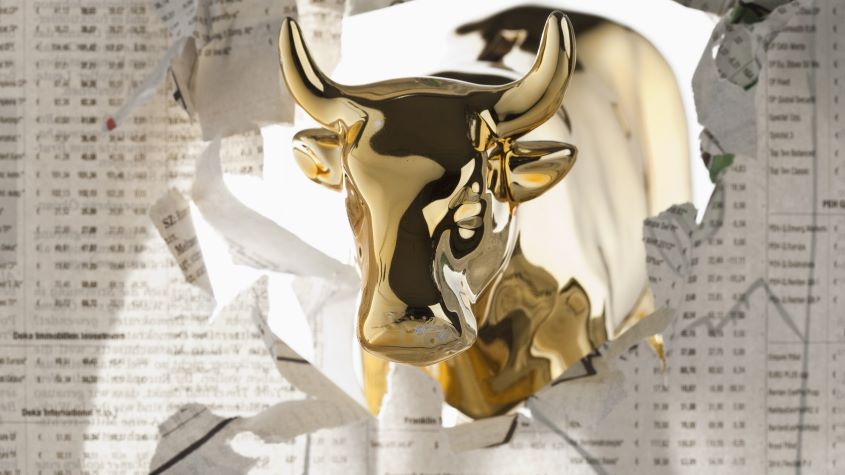What higher interest rates could mean for stocks
With interest rates rising rapidly around the world, the outlook for equities is becoming more and more uncertain – but what will higher interest rates mean for your stocks?


Get the latest financial news, insights and expert analysis from our award-winning MoneyWeek team, to help you understand what really matters when it comes to your finances.
You are now subscribed
Your newsletter sign-up was successful
Want to add more newsletters?
Central banks around the world are responding to rising inflation by hiking interest rates at the fastest pace in recent memory.
Broadly speaking, this is bad news for investors.
The point of raising rates is to convince consumers to spend less and save more. As spending falls, companies should start to cut prices in an effort to win a greater share of consumers’ reduced spending power.
Try 6 free issues of MoneyWeek today
Get unparalleled financial insight, analysis and expert opinion you can profit from.

Sign up to Money Morning
Don't miss the latest investment and personal finances news, market analysis, plus money-saving tips with our free twice-daily newsletter
Don't miss the latest investment and personal finances news, market analysis, plus money-saving tips with our free twice-daily newsletter
Higher rates are also pushing up the cost of borrowing. That could force both businesses and consumers to delay spending plans, putting pressure on suppliers to lower prices to try and keep market share.
Higher interest rates will hurt demand
The whole point of higher interest rates is to lower demand for goods and services – and that’s never good news for business.
A company that earns less is worth less; investors are going to have to factor this into their calculations.
However, reduced supply isn’t the only thing investors have to worry about. Higher interest rates also mean more expensive borrowing.
In the UK, the markets are now predicting that the Bank of England will raise interest rates to 5% or more next year as it tries to bring inflation under control. Government bonds (or gilts) have sold off to reflect these projections (bond prices fall as yields rise). The government is now paying more than 4% to borrow money for ten years, whereas only 12 months ago the rate was a little over 1%.
As most financial products are priced based on gilt rates, this has had a huge impact on the UK financial system. It has affected every part of the economy, from business borrowing to mortgages and credit cards.
This is bad news for companies that carry a lot of debt. The interest rate investors are demanding from businesses who want to borrow money has jumped to levels not seen since before the financial crisis. The average yield on a portfolio of high-grade corporate bonds – think blue-chip companies – recently hit 6.7%. Meanwhile, costs for distressed borrowers are in the double digits.
Based on the value of its outstanding bonds in the market, if retailer Iceland wanted to borrow money today, it would have to pay nearly 17% a year! To put that figure into perspective the interest rate on my Barclaycard credit card is 19.2% on purchases.
So, higher interest rates could hit business sales (the top line) and incur higher borrowing costs (the bottom line). And that’s without taking into account the other headwinds that come from inflation such as higher labour costs (these will also put pressure on profit margins).
Stocks could fall as valuations are revised
As well as these fundamental business challenges, there’s another factor investors need to be aware of: discount rates.
There are many different methods investors can use to try and value equities, but one of the most common is called the discount cash flow method. In its most basic form, this calculator is used to try and estimate how much a company could be worth today based on future cash generation.
There’s a lot of guesswork that goes into these calculations, so they are a bit hit and miss. Nevertheless, it’s a favourite tool of analysts and investors around the world.
To calculate the figure, analysts take the projected future cash flows from a business and discount them back to the present using interest rates of their choice. The rate is designed to compensate investors for the risk they’re taking when investing. This is usually based on the so-called risk-free rate, the US ten-year Treasury yield.
The calculation is based on the concept of the “time value of money”, that is the money you’re promised in the future is worth less than cash received today because you can invest today’s money for future growth. To put it another way, when investing in an asset you’re paying for the right to receive money in the future, so you need to have some idea of what it’s worth today.
Now, the discount cash flow analysis is very sensitive both to cash-flow estimates and the discount rate applied. The lower the discount rate, the higher the present value of future cash flows. On the other hand, the higher the rate, the lower the value of future cash flows.
So, if interest rates are rising around the world, investors won’t want to pay as much for equities as they might have been willing to pay a year ago when rates were lower. Coupled with the threat of falling sales and rising costs, this is a bit of a toxic combination for equities.
Get the latest financial news, insights and expert analysis from our award-winning MoneyWeek team, to help you understand what really matters when it comes to your finances.

Rupert is the former deputy digital editor of MoneyWeek. He's an active investor and has always been fascinated by the world of business and investing. His style has been heavily influenced by US investors Warren Buffett and Philip Carret. He is always looking for high-quality growth opportunities trading at a reasonable price, preferring cash generative businesses with strong balance sheets over blue-sky growth stocks.
Rupert has written for many UK and international publications including the Motley Fool, Gurufocus and ValueWalk, aimed at a range of readers; from the first timers to experienced high-net-worth individuals. Rupert has also founded and managed several businesses, including the New York-based hedge fund newsletter, Hidden Value Stocks. He has written over 20 ebooks and appeared as an expert commentator on the BBC World Service.
-
 Pensioners ‘running down larger pots’ to avoid inheritance tax as rule change looms
Pensioners ‘running down larger pots’ to avoid inheritance tax as rule change loomsChanges to inheritance tax (IHT) rules for unused pension pots from April 2027 could trigger an ‘exodus of large defined contribution pension pots’, as retirees spend their savings rather than leave their loved ones with an IHT bill.
-
 Why do experts think emerging markets will outperform?
Why do experts think emerging markets will outperform?Emerging markets were one of the top-performing themes of 2025, but they could have further to run as global investors diversify
-
 Why investors can no longer trust traditional statistical indicators
Why investors can no longer trust traditional statistical indicatorsOpinion The statistical indicators and data investors have relied on for decades are no longer fit for purpose. It's time to move on, says Helen Thomas
-
 Is it different this time for Japanese stocks?
Is it different this time for Japanese stocks?Analysis Nikkei 225 Index has jumped 19.8% this year, and there are signs the rally could continue.
-
 As China reopens, why pick an income strategy?
As China reopens, why pick an income strategy?Advertisement Feature Yoojeong Oh, Investment Manager, abrdn Asian Income Fund Limited
-
 Is Japan the best market to invest in now?
Is Japan the best market to invest in now?Opinion Japan puts Western economies to shame and offers good value for both equity and bond investors, says Max King.
-
 The highest yielding S&P 500 Dividend Aristocrats
The highest yielding S&P 500 Dividend AristocratsTips Dividends are a key component of investment returns in the long-term. A portfolio of dividend aristocrats is a great way to build wealth and a sustainable income stream.
-
 2023 will be a bumper year for stocks. Here’s how to play the rally
2023 will be a bumper year for stocks. Here’s how to play the rallyTips Dominic Frisby explains why he thinks the market rally could have further to run in 2023 despite macroeconomic headwinds
-
 China’s post-covid investment boom off to a slow start. Should you still invest in China?
China’s post-covid investment boom off to a slow start. Should you still invest in China?Advice Investors are no longer bullish on the China shop but the gloomy consensus on Beijing’s economy might be unfair. Should you invest in China?
-
 Stock market crash? This time it’s (slightly) different
Stock market crash? This time it’s (slightly) differentOpinion The bears expecting a stock market crash have got it wrong, says Max King.